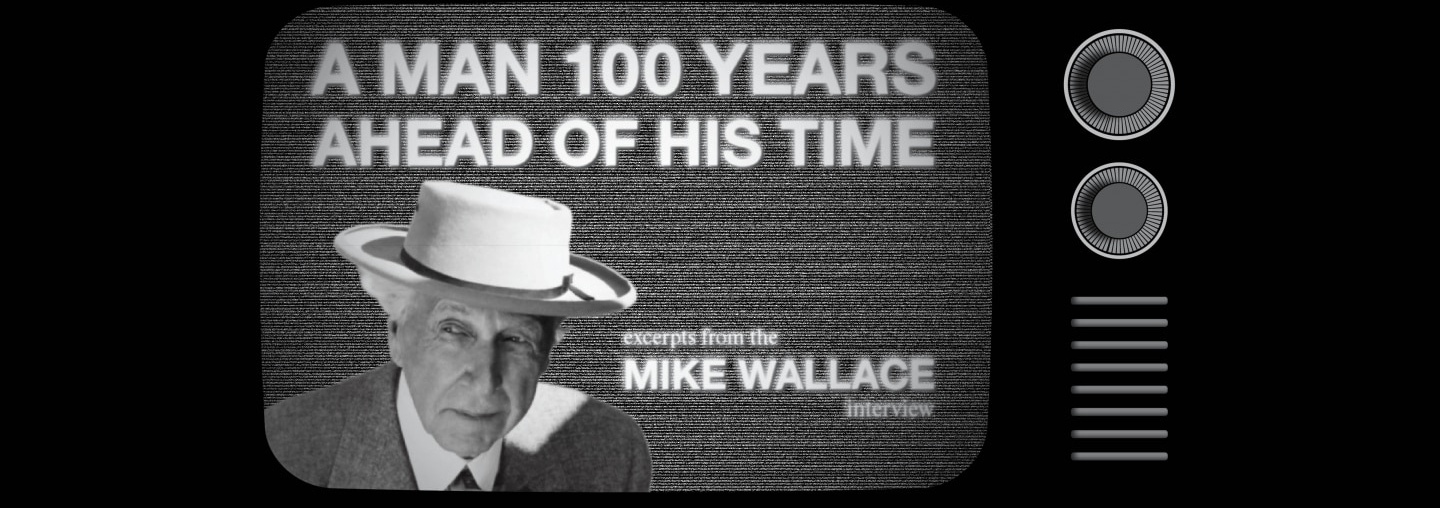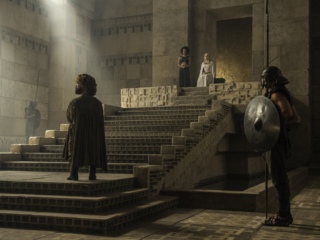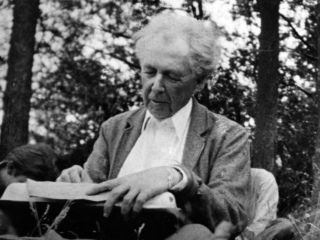
A Man 100 Years Ahead of His Time: Excerpts from the Mike Wallace Interview
Frank Lloyd Wright Foundation | Aug 20, 2019
In 1957, Frank Lloyd Wright appeared on the Mike Wallace Interview, a well-known television program of the late 1950s. Here we share excerpts from the interview, which give insight into Wright’s still-influential thoughts and feelings on a wide variety of topics.
While on the Mike Wallace Show, Wright shared his opinions on politics, death, American culture, architecture, religion, and more. Journalist and host Mike Wallace was known for his thoroughly-researched interviews with popular, and sometimes controversial, figures of the time. Wallace never held back in his questioning, and that was certainly the case when he interviewed Wright on two separate occasions. Wright’s ideas influenced popular culture and society, and continue to do so today. How can we connect these words—spoken in the 1950s —to Wright’s impact on our current and future visual landscape?
PART I
WALLACE: Tonight we go after the story of one of the most extraordinary men of our time … 88-year-old Frank Lloyd Wright, perhaps the greatest architect of the 20th century. And in the opinion of some, America’s foremost social rebel. According to a story in Life Magazine not many years back, fellow architects have called him everything from a great poet to an insupportable windbag. The clergy has deplored his morals, creditors have deplored his financial habits, politicians, his opinions. And we’ll get Frank Lloyd Wright’s views on morals, politics, religion, and architecture in just a moment.
WALLACE: And, now to our story. Admirers of Frank Lloyd Wright hail him as a man 100 years ahead of his time. Now, 88 years old, he is still designing homes and buildings which are revolutionary … But just as radical as Frank Lloyd Wright the architect is Frank Lloyd Wright the social critic.
WALLACE: You said many years ago, that you would someday be the greatest architect of the 20th century. Have you reached your goal?
WRIGHT: Well, now I think I never said it.
WALLACE: Well, I’ve done a considerable amount of reading …
WRIGHT: You know, I may not have said it, but I may have felt it.
WALLACE: Uh-huh. You do feel it?
WRIGHT: But it is so unbecoming to say it that I should have been careful about it. I’m not as crude as I am generally reported to be. I believe, like this matter of arrogance. Now what is arrogance?
WALLACE: What is arrogance?
WRIGHT: Arrogance is something a man possesses on the surface to defend the fact that he hasn’t got the thing that he pretends to have.
WALLACE: Arrogance can sometimes be a shell to protect the inner man too, can it not, even though that inner man has a good deal?
WRIGHT: Well, it’s a pretty brittle shell.
WALLACE: You say that if someone you deeply respected said that—is it unfair of me to ask you specifically whom you do deeply respect who is on the current scene?
WRIGHT: I respect any man or woman who respects himself
sufficiently to tell the truth no matter what or who it might hurt … I admired and respected my old master Louis Sullivan, despite of his faults. I think if you are going to admire and respect anybody you’ll have to put up with a few faults, won’t you?
WALLACE: Mr. Wright, you don’t have much faith in the
mob[ocracy], and yet I’m told that you have a good deal of faith in the Nation’s youth?
WRIGHT: I do.
WALLACE: How do you square one with the other?
WRIGHT: Why? Is the Nation’s youth a mob?
WALLACE: Is it not?
WRIGHT: No. I believe that a teenager is a teenager, and I think with him lies the hope of the future. Now architecture with us is a matter of the future. We don’t have it now. We haven’t had it yet, in any very great extent. But we’ve had letters from teenagers all over this Nation, for five, six, seven years, from Maine to Seattle, all over …
WALLACE: Well let me ask you this, what is your reaction when I tell you that the nation’s teenagers bought 11 million Elvis Presley records last year? Which group of youth do you think will inherit this country 15 years from now, the Elvis Presley fans or the Frank Lloyd Wright fans?
WRIGHT: The Frank Lloyd Wright fans. Undoubtedly. Why?
Because they’re on the side of nature and the other fans are on the side of an artificiality that’s doomed. Do you believe it? I do.
WALLACE: Mr. Wright I’d like your opinion on Charlie Chaplin the comedian and Charlie Chaplin the man.
WRIGHT: Not knowing Charlie Chaplin the man and only
knowing the comedian I would say that he has given me more pleasant laughs in hours than any other individual living.
WALLACE: I understand that you may still design a dream home for Marilyn Monroe and her husband Arthur Miller?
WRIGHT: Well, Mr. Arthur Miller has asked me if I’d be interested in designing a house for him, which would mean Mr. and Mrs. Miller, I imagine.
WALLACE: Yes
WRIGHT: And for Mrs. Miller and Mr. Arthur Miller I’d be very happy to design a house, but they haven’t asked me in so many words yet.
WALLACE: A revolutionary in his life as well as in his art, Frank Lloyd Wright belongs to what may be a vanishing breed. In an age of conformity he remains a defiant non-conformist, he believes in, and belongs to himself …
WRIGHT: Mike, am I listening to my epitaph?
↓ Scroll down to read excerpts from part two of the interview ↓
PART II
WALLACE: Tonight we go after the story of an American whom historians may rank as one of the greatest men of our times. And if they did rank him that high, Frank Lloyd Wright, a proud egotist, would be the first to compliment them on their good judgment. Born in 1869, and now probably the leading architect of the 20th century, Frank Lloyd Wright has also been hailed as a prophet in politics, religion, and morality. He’s been roundly damned too, for his scathing criticism of American culture.
WALLACE: Mr. Wright, first of all let me ask you this, you once said, “If I had another fifteen years to work, I could rebuild this entire country, I could change the nation.” Now, would you tell me why should you, one man, want to change the way of life of more than 170 million people?
WRIGHT: Well, have I said change the way of life?
WALLACE: Yes. When you say, “I could rebuild this entire country, I could change the nation.”
WRIGHT: I think the way of life in which the country … to which the country is committed needs that change, and I think it’s taking place, and I see no reason why with intelligence we shouldn’t plan it.
WALLACE: As an architect, how would you like to change the way that we live?
WRIGHT: I wouldn’t like to change so much the way we live, as what we live in, and how we live in it … We are shifting in what we live now; we don’t really live in it. We don’t really understand what it is to live in an organic building with organic character.
WALLACE: Mr. Wright, suppose you were approached by one of your students, one of your apprentices say, who felt pessimistic about his future because of the hydrogen bomb, the threat of war, the world’s general insecurity, and he came to you and he said, “Mr. Wright, help me to understand, give me something to live by.” What could you tell him?
WRIGHT: That’s what they’re all asking me. And that’s what I’m telling them, every Sunday morning, and all the time they are working with me. I don’t put a line on a drawing board if the answer isn’t there. And they are there, for the way of life we live which is the answer too to this very question you are asking. That’s why these youngsters come to me from all over the world.
WALLACE: And the answer is?
WRIGHT: The answer is, within yourself. Within the nature of the thing that you yourself represent, as yourself. And Jesus said it, I think, when he said, “The Kingdom of God is within you.” That’s where architecture lies, that’s where humanity lies, that’s where the future we’re going to have lies. If we are ever going to amount to anything—it’s there now, and all we have to do is to develop it.
WALLACE: Do you think that you are any less rebellious, less of a radical in your art and life, than you were a quarter of a century ago, Mr. Wright?
WRIGHT: That I’m more so. Only more quiet about it.
WALLACE: Are you afraid of death?
WRIGHT: Not at all. Walt Whitman is the guide on that; if you want to talk, to consult him—read him … Walt is a great friend.
WALLACE: Do you believe in personal … in your personal immortality?
WRIGHT: Yes. You get so far, as I am immortal. I will be immortal. To me, young has no meaning, it’s something you can do nothing about. Nothing at all. But youth is a quality, and if you have it, you never lose it. And when they put you into the box that’s your immortality.
WALLACE: Mr. Wright, I thank you for spending this half hour with us.
WRIGHT: Well, you’re welcome, I hope it’s been of some interest …
WALLACE: It has indeed.
WRIGHT: … to whoever has been listening. But I don’t know. ■
These excerpts originally appeared in the spring 2019 issue of the Frank Lloyd Wright Quarterly magazine, “Timeless: Frank Lloyd Wright + Contemporary Pop Culture.”



